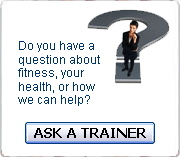|
Warming up takes two forms - overall, and specific. For the "overall" part, it's always a good idea to begin any strength workout with a short aerobic exercise to "get the blood" flowing. This should be a 5-10 minutes low intensity warm-up, and is not a substitute for a more focused aerobic workout.
"Specific" warm-ups are done before you begin heavy lifting with any given muscle group. The first time you work a muscle group you should do 10-12 reps at 60% to 75% of your intended first set weight. When combined with stretching, warming up will help prevent injuries and allow you to get the most from your workouts. If you allow a muscle group to cool by resting too long, between exercises, you should warm it up again before heavy lifting.
|




